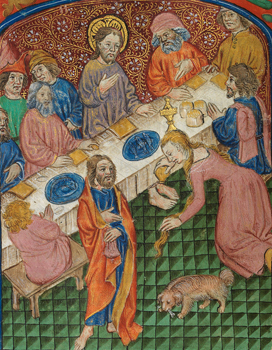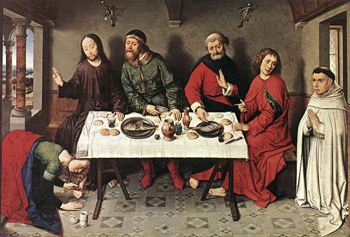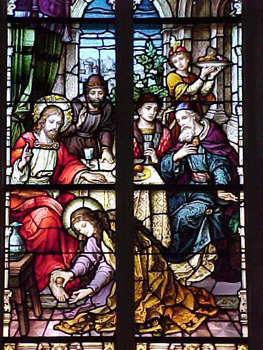Fifth Sunday in Lent
For Sunday March 13, 2015
Lectionary Readings (Revised Common Lectionary, Year C)
Psalm 126 or 119:9–16
Philippians 3:4b–14
John 12:1–8
A guest essay by Carrie LeRoy, an intellectual property transaction attorney based in Palo Alto and mother of three. Mrs. LeRoy is the leader of an innovative pro bono program focused on educating teens about laws relating to social media usage and sexual assault. The program aims to empower teens to be good citizens online and to deter unlawful conduct. Mrs. LeRoy has trained organizations and other attorneys to enable the program’s expansion. In 2014, she received a “Legal Innovators” award from The Recorder in recognition of her work on the program. In 2015, Mrs. LeRoy was selected by the Silicon Valley Business Journal as one of the publication’s “Women of Influence.” She also was the recipient of The Wiley W. Manuel Award for Pro Bono Legal Services from the California Bar for providing legal services to the poor.
Until recently moving to a neighboring town, I lived most of my life in Palo Alto, California, an affluent Silicon Valley town that attracts the most ambitious, best minds — high achievers, accomplished, you know, driven people — the place to lean in (along with Sheryl Sandberg).
As the mother of a teen in Palo Alto, it is an understatement to say that it was rather unsettling when, a few years ago, the Dr. Phil show descended upon my town to interview teens about what we now reluctantly admit was the first of two teen suicide clusters in the past six years. The teen suicide rate in Palo Alto is reportedly five times the national average. In February of this year, the CDC launched an epidemiological study of the Palo Alto teen suicide clusters. There's an interesting, in-depth article in the December 2015 Atlantic that explores this topic called “The Silicon Valley Suicides: 'Why Are So Many Bright Prospects Killing Themselves In Palo Alto?'"
Suicide is complicated. I'm not a mental health expert, and I won't attempt to answer the one question that matters: why? I note that psychology professor Dr. Suniya Luthar, cited in the Atlantic article, expressed concern that, in relation to the suicides, “[t]here are a lot of very hard truths that are just not being spoken.” We throw our collective hands up in the air, say that there is no single factor that leads to suicide, and follow the protocols on communications aimed at preventing suicide contagion: keep it quiet and label each suicide an anomaly. But while the CDC tries to get to the bottom of the teen suicide epidemic, do we also need to consider the “hard truths” that are unspoken? What are we overlooking?
In January of this year, I learned that my former Palo Alto neighbor, a forty-six year old mother of two teens, committed suicide. I lived across the street from her (I’ll call her Jen) for six years. Jen was Chinese American, she smiled and waved at me, engaged in small talk, and showed no outward signs of mental illness or distress whatsoever. Our kids attended a birthday party at her house, and she and her family attended a Christmas party at our house.
 |
|
Mary anoints Jesus's feet.
|
Since her death, I’ve learned that Jen suffered from severe depression, anxiety, and the downward spiral of shame, experienced in isolation and secrecy. Jen's family is openly talking about this — now.
It’s Lent — I’d say a fine time in the Christian tradition to examine our own hard truths. Here’s mine in relation to Jen: while busy finding relief from my own angst through centering prayer and increasing involvement in my church community, I overlooked my neighbor Jen entirely. I could say that I was too busy — and that I was occupied with several worthwhile endeavors, and that it's of course not always possible for us to detect or reach out to a neighbor in distress.
But it wasn’t just about being busy — not long after Jen moved to my neighborhood, Yale Law School Professor Amy Chua published her book Battle Hymn of the Tiger Mother to explain to American Caucasians like me why Chinese mothers do a better job of preparing their offspring for worldly success. I saw Jen, but I did not really see Jen. I will blame what must have been my bias that says people like Jen are always the picture of mental health, strong, resilient — better than me at holding it all together in a world that wants me to prioritize competition, success and the accumulation of things.
Since her death, I have been replaying a conversation in my head that I could have had with Jen. It goes something like this: “Smile, Jen, haven’t you heard that saying (attributed to Jiddu Krishnamurti) that ‘It is no measure of health to be well adjusted to a profoundly sick society?' It’s not you — it’s this place and time. We both have kids in a city that's dealing with a teen suicide epidemic — I’m scared, too.
My son tells me that he has no friends and that people at his high school are too busy focusing on their academic achievement to even talk to him. Oh, you feel alone and disconnected from others? Me, too. The weight of the world falls on you at times? Me, too. Oh, I don’t need to sell you on my particular religion, but I want you to know that community is vital — as Maya Angelou reminds us in her poem, Alone.
Lying, thinking
Last night
How to find my soul a home
Where water is not thirsty
And bread loaf is not stone
I came up with one thing
And I don't believe I'm wrong
That nobody,
But nobody
Can make it out here alone.Alone, all alone
Nobody, but nobody
Can make it out here alone.
There are some millionaires
With money they can't use
Their wives run round like banshees
Their children sing the blues
They've got expensive doctors
To cure their hearts of stone.
But nobody
No, nobody
Can make it out here alone.Alone, all alone
Nobody, but nobody
Can make it out here alone.Now if you listen closely
I'll tell you what I know
Storm clouds are gathering
The wind is gonna blow
The race of man is suffering
And I can hear the moan,
'Cause nobody,
But nobody
Can make it out here alone.Alone, all alone
Nobody, but nobody
Can make it out here alone.
I don’t have all of the answers, Jen, but the only way to get through suffering is together — this I know. Being a mother, working long hours, achieving success or perfection in every aspect of our lives is kind of impossible, don’t you think?
May I tell you about the time my mother, who suffered from paranoid schizophrenia and depression, tried to commit suicide when I was nine years old? I am so grateful that she survived and that her medication regime significantly improved the quality of her life, including the time that she spent with her grandkids in her later years.
Jen, we need you here — would you like to join my centering prayer group? It’s a Christian form of meditation, but you don’t have to be Christian — you just have to be anxious (being depressed is optional!). We are all odd balls trying to find practices that make us feel just a bit more sane as we struggle with the sense that the priorities of the world leave us feeling worried, empty, drained, and isolated — just maybe, Jen, these priorities are wrong. Maybe the hope for us is not in leaning in, but in leaning out!"
Too often, our truths are held in silence and isolation. In the reading from the apostle Paul this week, he writes to the Philippians from his jail cell: “I have suffered the loss of all things, and I regard them as rubbish, in order that I may gain Christ.” (Philippians 3:8).
 |
|
Christ in the House of Simon by Dieric Bouts, 15th century.
|
The “things” and attachments of this world are not enough — not for Paul, not for Jen, not for any of us: status, wealth, possessions, appearances, fear of truly being seen or seeing others, fear of the Tiger Mom and other assorted “rubbish” stand in the way of our ability to be “in” Christ. How could I love my neighbor if I could not even see her?
Author Dr. Brené Brown, famous for her TED Talks on vulnerability and shame, calls “me, too” the two most powerful words in the English language when we’re struggling. I will never know what pain Jen was carrying. Jen is gone — her children are now adjusting to a new, awful reality.
I'll never know whether, if it had occurred, my imagined conversation with Jen would have made any difference. But what is left for me is a renewed commitment to a rejection of the “rubbish” in favor of open and authentic expressions of sometimes hard truths. Whatever conclusions are ultimately drawn by the CDC regarding teen suicide in Palo Alto, I believe that we (as individuals and communities) need to discern and acknowledge our blind spots and open up about our own struggles, including mental health issues, so that we can see these not as signs of weakness to be borne in shame and isolation, but as vital to our humanity and even full of promise: the brokenness in me greets the brokenness in you.
Perhaps the most profound manifestation of “me, too” is Jesus’s naked suffering on the cross. And that moment of vulnerability points, of course, towards the promise of resurrection.
Image credits: (1) Wikipedia.org; (2) Jesus-Story.net; and (3) Wikipedia.org.






